Fashion, like any industry, has its share of quackery, and no one gets treated to more “miracle products” or “life-changing purchases” than a man with some meat on his bones.
You can forget most of that stuff.
It’s not effective, and it’s creating a problem where there isn’t one.
Dressing well is about presenting your body in the best and most flattering way possible — without trying to distort or alter the body itself. Anything else is just costuming.
To that end, we’ve put together our best advice for the big men of the world.
Whether you’re round-bellied, broad-shouldered, big-bottomed, or all three at once, you can look comfortable, stylish, and suave with a little savvy dressing.
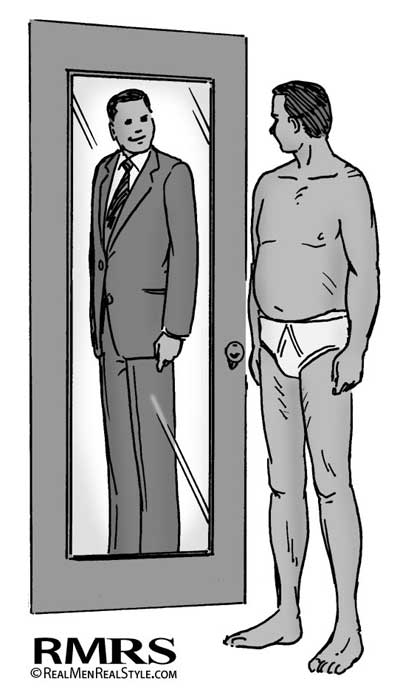
The Importance of Style for Large Men
You don’t really need me to tell you what the general (and unfounded) assumptions are about overweight men: fat, sloppy, lazy, greedy, etc. As unfair as these judgements may be, they’re the reality in our society. But if your weight isn’t there for a specific purpose (like you’re an NFL linebacker), you owe it to yourself to work to shed those pounds — not fundamentally to impress other people, but because of the benefits to your physical and mental health that will accrue as you get fit. Yet even if you’re already in the midst of a weight loss journey, you still need to dress the body you have right now; you shouldn’t wait until you’ve reached your ultimate goal to start trying to look your best.
The reason style takes on such importance — and the reason we’re writing about it — is that bad or careless style on a person of average or slender build just makes them forgettable. On a large man, it’s taken as proof of the negative assumptions mentioned above: obviously the fat man is indeed a lazy slob, or he’d have taken time to dress himself better.
As frustrating as that is, it’s a pretty compelling argument for looking your best. And happily, that’s just as easy to do for a heavyset man as it is for anyone else.
Priorities: What a Big Man Wants from His Clothing
We’ll get into specific styles and outfits in a bit, but there are a few things that should always be on your mind if you’re purchasing clothing for a bigger body:
1. Fit
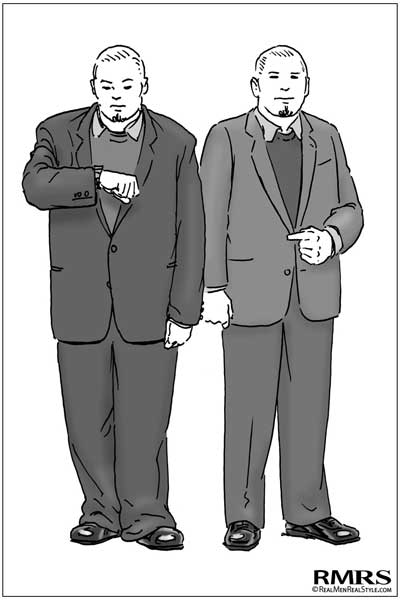
Bad fit to the left, good fit to the right. ALWAYS use a tailor.
It’s true for any man, and doubly so for large men: the fit of your clothing is its most important quality.
If you’ve got bulges, wrinkles, or sagging cloth, it’s going to make your outline look sloppy. On a large man, the effect gets amplified, and it looks even worse. Many large men dress in clothes that are several sizes too big, thinking they are disguising their physique. But baggy clothes don’t fool anyone and in fact draw more attention to your weight while downgrading your overall appearance and the impression you make.
There’s also a simple comfort issue here: the better the fit, the more comfortable your clothes feel, which is good for your mood and for your appearance.
So your first consideration with any garment should always be the fit. You want the cloth to rest lightly on your body — not hugging it tight and not hanging off your skin with visible folds of extra cloth.
The odds of finding something with a perfect fit off the rack are pretty low, so get to know a good tailor. Simple adjustments like hemming trousers or taking a shirt in at the waist are cheap fixes — usually $10-20 — that can make generically-sized department store clothes into well-fitted garments.
2. Simplicity
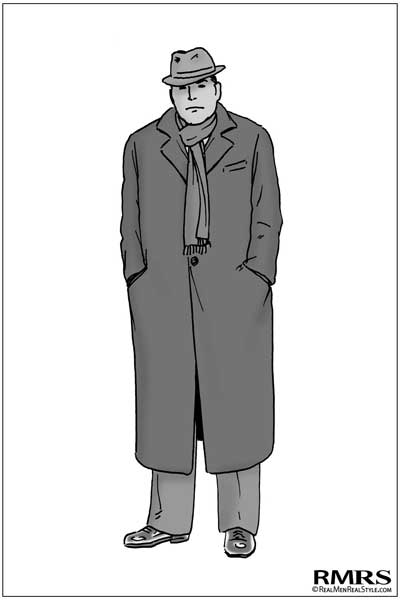
Keep it simple: for a large man, a well-fitted, solid, dark colored, full-length overcoat is perfect.
If you’ve got a big frame, you’ve also already got an imposing presence. Dress simple, so that it doesn’t become an overwhelming effect.
Good clothes for large men keep the patterns to a minimum. Broad, solid spaces help complement your shape — be thinking solid-color jackets, lightly striped shirts, and so on, rather than anything with busy graphics or patterns.
3. Lightweight
Thick, heavy cloth accentuates your size and makes you look bulky.
Heavier clothing can also hold heat in, and contribute to excessive sweating, which is something that many big men need to be cautious of. Even if you don’t have sweat issues, you still want to keep your clothing light.
The difference between fine wool trousers and a pair of thick denim jeans doesn’t sound like much, but when you try the pants on you realize just how significant the upgrade can be. A smooth, light fabric that drapes in clean lines is always going to make a large man look (and feel) better than something chunky.
What the Right Clothes Can (and Can’t) Do for You
Reality check: you’re not going to find clothes that dramatically alter the shape of your body.
You might find something so immensely loose that, like a burqa, it hides the shape completely, but that’s not a look most guys are going for. It often ends up looking more like a parachute than a nice garment.
Good clothing doesn’t change the shape of your body. It makes everything look proportional, balanced, and neatly framed.
Anything that’s sold with the premise of making you thinner (compression girdles and so on) is likely to have a passing effect at best, and probably at the expense of your comfort. That’s a losing proposition in the long run, since an uncomfortable man tends to also be one who fidgets, shifts, and otherwise looks nervous and unappealing.
The best effect of good clothing is to change people’s automatic first impression from “a fat man” to “a big man.”
On paper, that looks like a meaningless distinction, but in people’s minds it becomes the difference between “lazy, soft, and weak” and “powerful, imposing, and confident.”
If you’ll pardon the pun, that’s a big difference.
Clothing for Large Men: The Good, the Bad, and the Ugly
Now that you know what you’re looking for in general, we can talk about a few specific styles.
Keep in mind that there will always be some exceptions to these guidelines. But for the most part, there are certain kinds of clothing that we can describe as being “good” or “bad” for large men.
And yes, there are one or two styles that are just plain disastrous. Stay away from the “uglies” unless you have a very compelling reason to wear them!
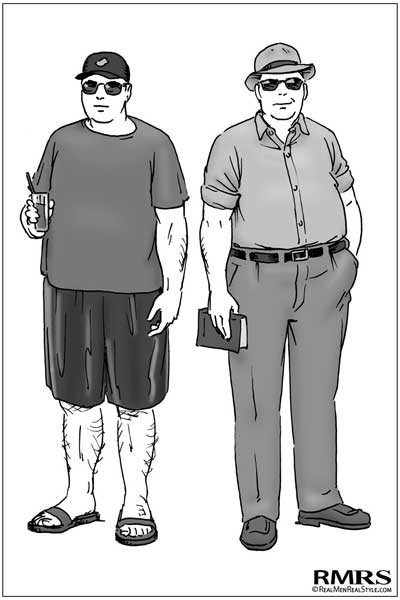
The man to the left is wearing clothing that makes him look heavier; the man on the right isn’t hiding his weight and is showing that he pays attention to the details.
Good Clothes for Large Men
The best clothes are ones that give a clear, clean, defined shape to the body. That puts suits, blazers, and sports coats right at the top of the list: these are going to “frame” the body and make it look neatly self-contained.
In addition to jackets, smooth slacks (as opposed to jeans) give a nice, clean front, and in colder weather a long overcoat is a great way to make a solid impression with your whole body.
For an excellent summary of how large men can wear suits well, click here to visit our friends over at the Gentleman’s Gazette.
Bad Clothes for Large Men
Things get more problematic when clothes become softer and the outlines less defined.
That means that large men want to use some caution when they’re buying things like sweatshirts and sweaters. They can work — the flat front over the belly can be advantageous, as can something that covers the waistline of the trouser — but you need a nice, close fit and no wrinkles or bulges.
Athletic wear is a similar mixed bag: it obviously makes sense if you’re working out, but in other settings it looks a little too shapeless. It’s also very low formality, which can play into “lazy slob” stereotypes. Try to avoid leaving the house in sweatpants or athletic T-shirts unless it’s to hit the gym or go for a jog.
Ugly Clothes for Large Men
The worst of all possible worlds is anything that combines a saggy fit, low formality, and lots of bare flesh. (The latter has less to do with flesh looking unattractive, and more to do with the contrast it sets up: if your legs and arms are bare, it draws all the attention to your center, which emphasizes your belly and crotch/butt region.)
So steer clear of loose T-shirts, tank-tops, and baggy shorts. Those don’t look great on anyone, and on a heavyset man they’re especially unflattering. Shorts in general are worth avoiding, but if you do wear them, resist the temptation to go with long, baggy ones — your lower legs will look like skinny pegs in comparison, giving you a massively top-heavy appearance.
In general, larger men will look best if they stick to long sleeves and trousers, and select dressier styles that add a little class to their overall appearance.
7 Easy Style Upgrades for Large Men
If you’re a big guy who’s looking to dress a little sharper without breaking the bank on an entirely new wardrobe, we have some tips for you. These are all basic upgrades within your wardrobe — just swapping one item or particular style for another. Put together, they can add up to a big improvement.
1. Switch from Belts to Suspenders
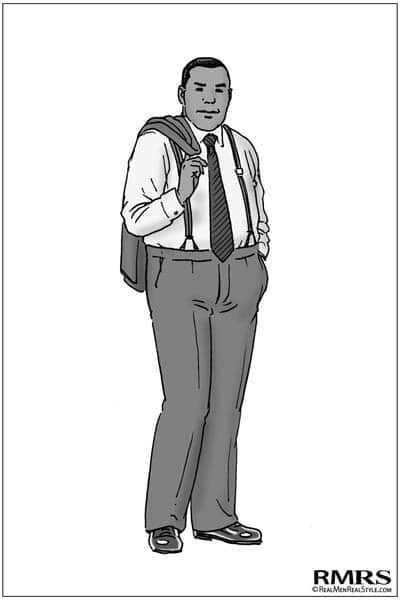
Suspenders are a classic menswear accessory — not just for your grandfather.
Belts aren’t much use to men with large, round stomachs. Because the shape of the stomach tapers, a circular band around it is just going to slip right off — it’s like trying to fasten a collar around the lower third of a basketball.
Suspenders avoid the issue entirely, and let the trouser front fall in a smooth drape instead of bunching it up at the top.
A habit of wearing suspenders also helps keep the quality of your pant purchasing habits up — most cheap trousers don’t come with the internal anchors for suspenders. You can have a tailor add them for a couple bucks, or use metal clamp-style suspenders, but ideally you should build a collection of nice slacks that can take button-style suspenders.
2. Buy Dress Shirts with Spread Collars
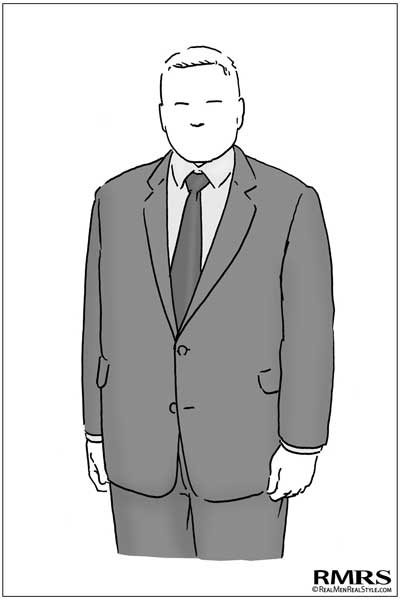
Notice the proportions of the tie, tie knot, and collar.
If you’ve got a broad face, get a broad collar to go with it.
Most brands designate anything with a separation of greater than 90 degrees between the collar points as a “spread.” Some will be more extreme than others, so find a brand and a style you like.
Spread collars help keep your face looking proportional, and they give you room to tie a nice big necktie knot as well (try the Full Windsor). You’ll want to do that when you’re wearing a tie — a big guy with a thin tie and a tiny knot looks clownish.
3. Wear a Hat
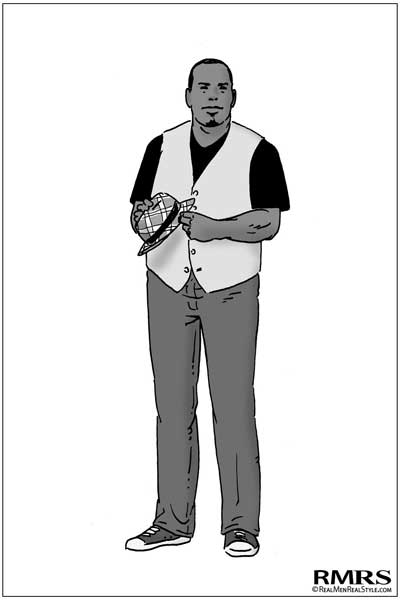
Wearing a hat requires CONFIDENCE — and makes you look taller!
A hat is one of those great style tools that make almost anything into an “outfit.”
By throwing a stylish hat on, you’re demonstrating that you went to more than the minimum effort when you got dressed. That automatically dispels any “fat = lazy” assumptions.
You also gain a little more vertical space with a hat, which can be nice for guys who are both solidly-built and short. The crown of the hat stretches your overall height a bit further, which helps “spread” your weight a little further.
To learn the basics of wearing a hat, visit these classic AoM articles on “Bringing Back the Hat” and “Finding the Perfect Hat for Your Ugly Mug.”
4. Wear Overalls for Manual Labor
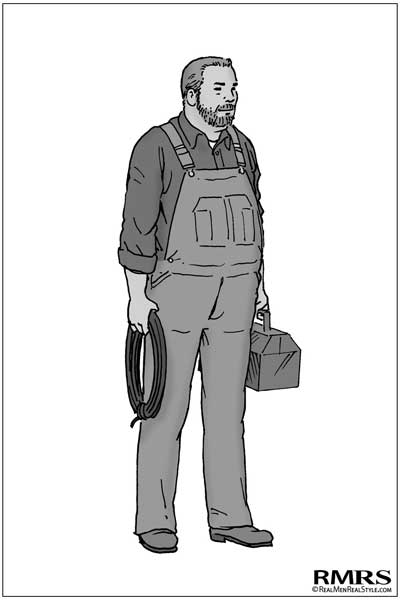
Plumber’s crack was never seen again after Jim switched his company’s uniform to overalls.
Rather than jeans and a T-shirt, which are prone to hiking up/down to expose your belly and plumber’s crack, go with a pair of overalls for any serious manual labor.
It’s a classic manly style; the bib front helps smooth out the appearance of your belly, and as an added bonus they’re practical protection from spills and minor abrasions.
You’re not limited to blue denim here — brands like Carhartt and Dickies make good workwear in brown, navy blue, black, and other straightforward colors. Just steer clear of the blaze orange unless you’re actually going hunting.
For more information on blue collar style, click here for a classic AoM article.
5. Sport Well-Groomed Facial Hair
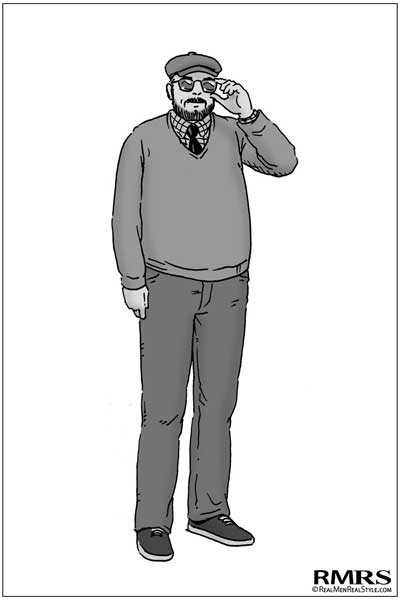
A well-groomed beard can hide a double chin and elongate the face.
Don’t go all department store Santa here or anything, but a neatly-trimmed beard around the chin and jawline can really help firm up a soft-faced man’s features.
You do need to be good about maintenance here — a big guy with a neat beard is going to be seen as stylish; a big guy with stubble everywhere or a curly neckbeard is going to be taken for a slob. You can’t get away with messy facial hair if you want people to take you seriously.
But if you can keep it trim, a neat little goatee can sharpen up your chin, while whiskers on the jawline help put a more squared-off frame around your cheeks.
Don’t know where to start with your beard-growing? We’ve got you covered.
6. Wear Large Accessories
Proportion is very important for a big man. The bigger you are, the bigger you want your accessories to be, too — upgrade a flimsy plastic ballpoint for a fountain pen with some real heft, for example, and always keep your watch faces on the larger side.
As an added bonus, people tend to think of large, thick accessories (especially watches and neckties) as “power” items, conveying the strength and presence of the wearer, which is exactly what you want associated with your size.
7. Wear Tailored Shirts Untucked
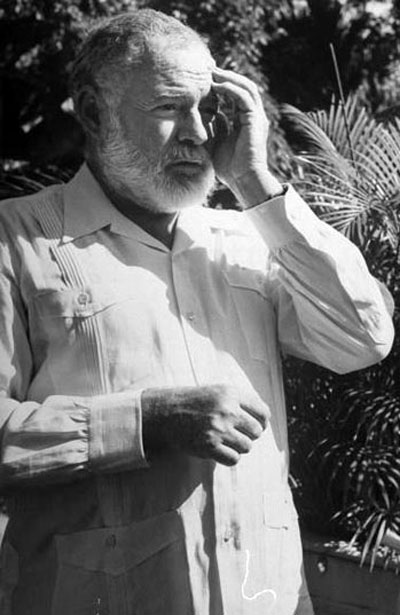
Hemingway in a guayabera.
A single flat plane of fabric over the stomach draws less attention than a waistband contrasting with a shirt. As a result, shirts that can be worn untucked tend to de-emphasize the waistline.
Shirts with round, even hems (rather than “ducktail” styles, which are longer in the front and back) are made to drape over the trouser waist. Polos are often worn this way, as are button-fronted summer shirts. However, be careful with these styles as if you’re sporting a large midsection they do not flatter unless the fit is perfect. Instead look to try a guayabera.
Long-sleeved collared shirts are less likely to be worn untucked, but light sweaters can go over them to fill the same role. In strict business-dress situations there’s not much you can do — anything but a tucked-in dress shirt is too informal — but your social wardrobe should have some good round-hem options for wearing untucked.
Conclusion
Dressing well as a large man isn’t all that different from dressing well with any other body type. More than anything, it relies on honesty about your figure, and the patience to get clothes that actually fit.
If you’re willing to pick the styles that flatter your body type and get them adjusted to fit properly, you’ll look neat, stylish, and well-built no matter what you weigh.
Watch the Video
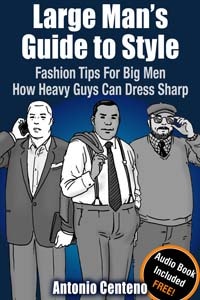 Are you a large man and want more style help?
Are you a large man and want more style help?
Check out my book: Large Man’s Guide to Style: Fashion Tips for Big Men.
Written By Antonio Centeno
For Men’s Style Fashion Tips – Click Here


